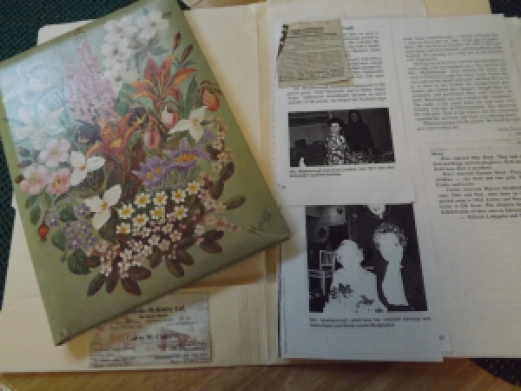
When your just getting into your family history you don’t realize all the things you have available at your fingertips… well maybe they are tucked away in a drawer or closet, but you probably have them.
As I mentioned in Begin at the Beginning you have to start with yourself and collecting all the bits and pieces in one place is a good way to start. So get out that archival box and start putting those things you have collected all together. Some items that you might have are;
- Vital Records – these documents record those milestone events in life. Birth certificates, marriage licenses and certificates, divorce records and death certificates. Sometimes these records aren’t completely accurate. For example; a death records is accurate for gender, cause of death and location. But it may not be accurate for name and date of birth and if parents names are given, then they may not be accurate either.
- Religious Records – certificates of baptism, christening, confirmation, bar mitzvah or bat mitzvah can all be found in family papers. You may also find a document of marriage issued by the church rather than a government issued marriage license or certificate. Maybe you have old church bulletins.
- Personal or Family Bible – You may have a family member that took the time to fill out the pages containing, some or all; recordings of births, christening, confirmation, marriage and deaths. Note if the information was put in by one person at one time or if they were entered at time of each event. You can tell this by different handwriting or different ink or pencil.
- Photograph Albums – family albums contain photographs and other family mementos of importance. If your lucky and someone labelled with at least the names that’s great. But if not, you’ll have to show them to other family members to help you identify and label the pictures. But that’s not all bad, because it gives you a starting point for discussion.
- Scrapbooks – this is a past time that has fallen by the wayside in my mind, so if you find them they often are a gold mine of information chronicling a lifetime of events in an individual or a family.
- Letters, Diaries and Journals – everyday life events and sometimes innermost thoughts are to be found in these items. They will give you a glimpse into their lifestyle at the time, or the things they purchased or maybe just what the weather was like.
- Family Histories – often you aren’t the first person in your family who was interested in the family. This doesn’t mean your work is done but it means you have a starting point that you can follow and re-prove and add to.
- Local Histories – often people who have lived in an area will purchase the local history book because their family is included in the book.
- Baby Book – these too can provide you with quite a bit of information. Especially if it’s for a first child.. isn’t that what always happens.. the first child get the baby book and all the photos. My baby book tells which cousins I spent my first birthday with.
- Funeral Books and Memorial Cards – guest books can tell you who was at the event. This can give you clues as to who is still alive at that time if you’re not sure. The memorial cards can provide dates of birth and location as well as telling you when the person passed away and where and when the funeral service and burial took place.
- Obituaries – these are probably one of my most favourite documents and they often provide so many details about the family that I have to read them over and over. My grandmother kept copies of all the family obituaries and they have been a huge help in my own research.
- Military Records – these can be service statements, disability certificates, discharge papers or pension records. You may have medals, ribbons or uniforms.
If you don’t find these types of records in your own home then ask your parents, grandparents or aunts and uncles if they have any of these things. If they do; then take that opportunity to go over and scan these items. It’s a great way to let people know your interested in the family and a great ice breaker into the subject.

